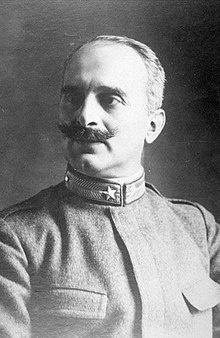The Command of the Air
| Giulio Douhet | |
|---|---|
 |
|
| Born |
30 May 1869 Caserta, Campania, Italy |
| Died | 15 February 1930 (aged 60) |
| Nationality | Italian |
| Aviation career | |
| Known for | air power theories, a key proponent of strategic bombing |
General Giulio Douhet (30 May 1869 – 15 February 1930) was an Italian general and air power theorist. He was a key proponent of strategic bombing in aerial warfare. He was a contemporary of the 1920s air warfare advocates Walther Wever, Billy Mitchell and Sir Hugh Trenchard.
Born in Caserta, Campania, Italy, he attended the Modena Military Academy and was commissioned into the artillery of the Italian Army in 1882. Later he attended the Polytechnic Institute in Turin where he studied science and engineering.
Assigned to the General Staff shortly after the beginning of the new century, Douhet published lectures on military mechanization. With the arrival of dirigibles and then fixed-wing aircraft in Italy he quickly recognized the military potential of the new technology. Douhet saw the pitfalls of allowing air power to be fettered by ground commanders and began to advocate the creation of a separate air arm commanded by airmen. He teamed up with the young aircraft engineer Gianni Caproni to extol the virtues of air power in the years ahead.
In 1911, Italy went to war against the Ottoman Empire for control of Libya. During that war aircraft operated for the first time in reconnaissance, transport, artillery spotting and even limited bombing roles. Douhet wrote a report on the aviation lessons learned in which he suggested high altitude bombing should be the primary role of aircraft. In 1912 Douhet assumed command of the Italian aviation battalion at Turin, where he wrote a set of Rules for the Use of Airplanes in War—one of the first doctrine manuals of its kind. However, Douhet's preaching on air power marked him as a 'radical'. After an incident in which he ordered construction of Caproni bombers without authorization, he was exiled to the infantry.
...
Wikipedia
